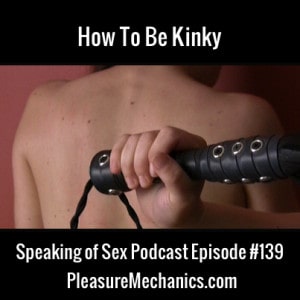Podcast: Play in new window | Download

Ready to explore kinky sex?
Want to know how to be kinky but don’t know where to get started?
We are here to guide you on the adventure!
If you know you are ready to learn how to be kinky, enroll now in our Kinky Sex Mastery Course!
But maybe you are thinking:
- I don’t even know WHAT I want in bed
- My partner would never be up for it (but I want it so bad!)
- I am afraid I’ll hurt my partner
- I am too shy to be kinky!
- I think I’ll get in over my head and lose control
We understand all of these thoughts. We’ve even had some of them ourselves. We know that trying new things in bed can be scary and overwhelming. We get that it can be hard to ask your partner to play along with your desires.
That’s exactly what inspired us to design this course for you!
Over the past few years (especially since the 50 Shades craze!) we have heard from THOUSANDS of you who long for kinkier, rougher and more creative play in bed. You want more thrills, more excitement, more sensation. But you don’t know how to get started.
Searching the internet won’t help – we know because we tried. Even the “beginner” kink education out there is way too risky and too much for most people. Most of what is out there just sets you up for failure.
We weren’t happy with what we found – so we have spent over a year designing a course just for you.
This is a true beginner’s course – we take you step by step through building the skills of kink so you can be free to explore your deepest desires. But let’s be clear: you’ll have the chance to explore everything from intense sensation to bondage, from domination to roleplaying. Beginner doesn’t mean boring, it means we are setting you up for wildly successful explorations!
Want to discover how to be kinky? Enroll now in Kinky Sex Mastery and start your adventure now!
 Richard Freiherr von Krafft-Ebing was a prominent German psychologist and forensic expert who published Psychopathia Sexualis in 1886. This was a European best seller, went into over a dozen editions in the author’s lifetime, and the book is now considered one of the first texts in sexology, the scientific study of sexuality.
Richard Freiherr von Krafft-Ebing was a prominent German psychologist and forensic expert who published Psychopathia Sexualis in 1886. This was a European best seller, went into over a dozen editions in the author’s lifetime, and the book is now considered one of the first texts in sexology, the scientific study of sexuality. Are you bored in bed?
Are you bored in bed? 

